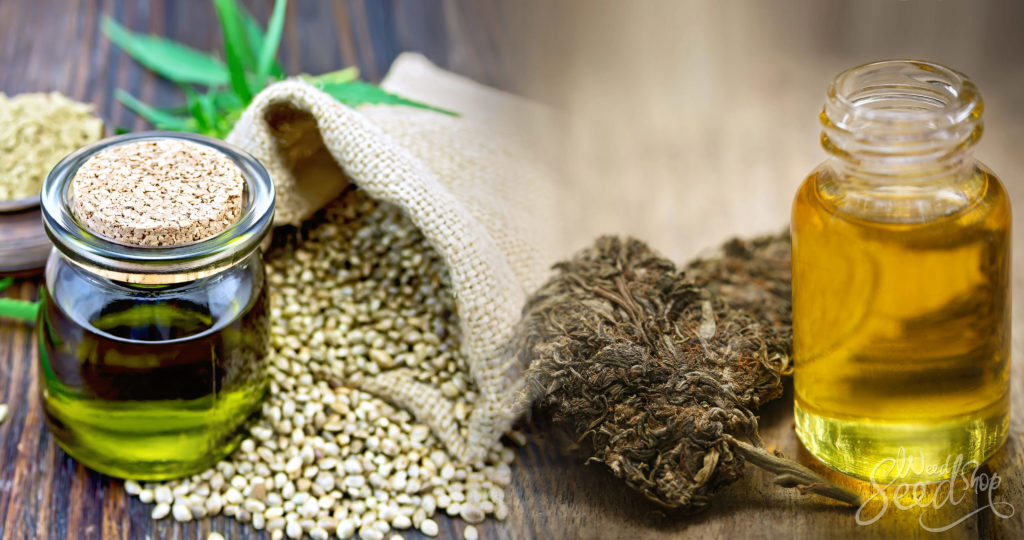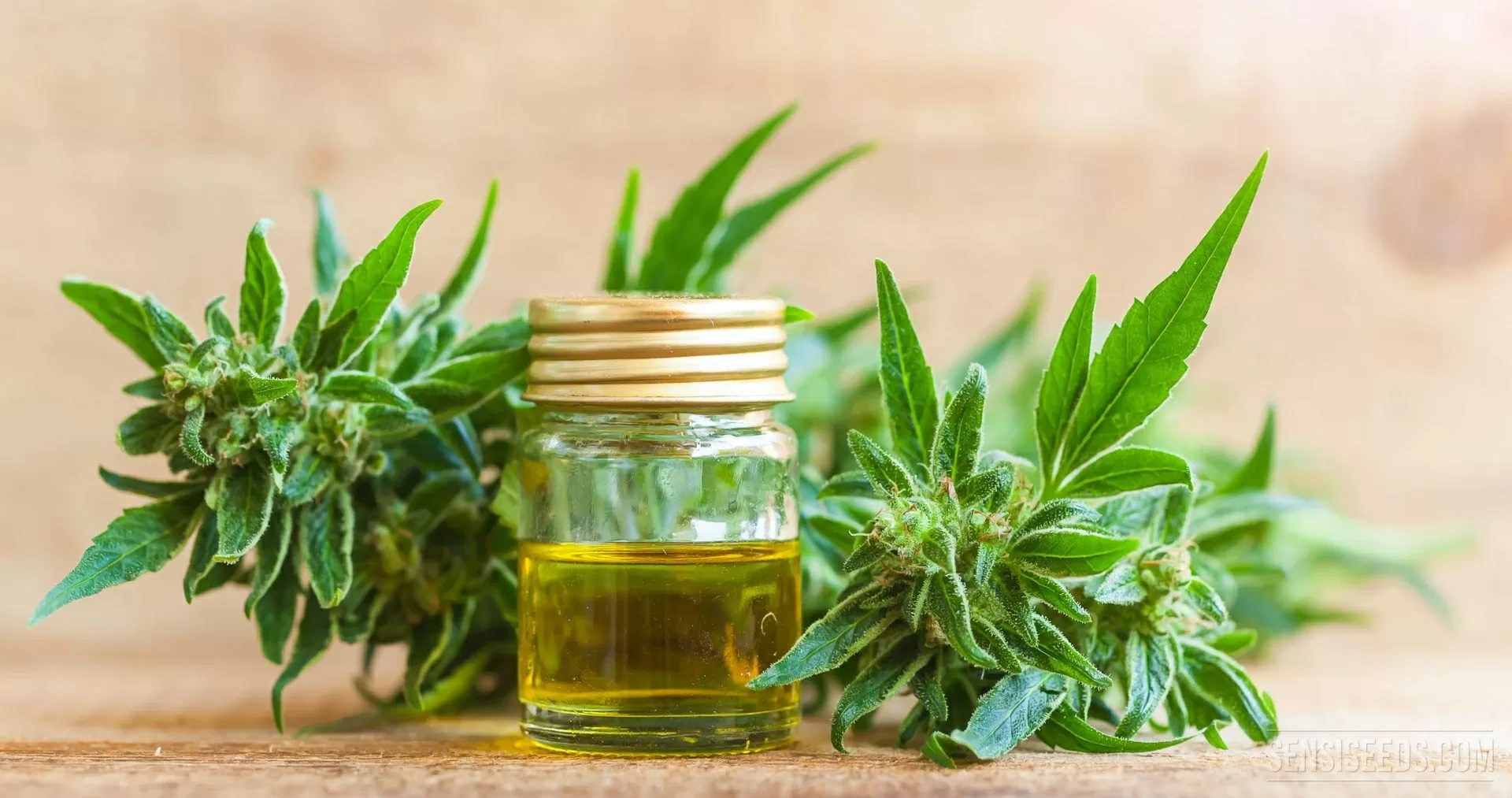The term cannabis oil is generally used to define the different oils derived from the sativa or indica hemp plant, distinguished by virtue of the concentration of cannabinoids such as CBD and THC present, the extraction methods employed and the plant components used throughout the production process.
While THC or tetracannabidiol is directly responsible for the typical psychotropic effect of marijuana, CBD or cannabidiol is known for its strong therapeutic properties that affect the entire body. Both, however, act in synergy, despite having opposite actions, in order to significantly improve a person's health.
Generally speaking, therefore, cannabis oil is not the oil obtained from cold-pressing the seed of the marijuana plant, in this case known as hemp oil or hemp seed oil, but rather a derivative that contains different concentrations of phytocannabinoids extracted from the plant material or from seeds that have come into contact with its resin rich in active ingredients. In the case of hemp oil, it is mainly used for food purposes, while cannabis oil in the strict sense, where THC and CBD predominate, is widely used for recreational or therapeutic purposes.
What is cannabis oil and what effects does it have?
Cannabis oil, also known as hemp seed oil, is a genuine medicinal and therapeutic preparation obtained by cold pressing the hemp seeds, an extraction process which, among the many available, allows all the organoleptic properties of the derivative to be preserved intact.
However, there are substantial differences when compared to what is obtained from the distillation of the weed of legal hemp sativa, the so-called hash oil, an oleoresin that usually tends to be easily confused with the common hemp oil or hemp seed oil: it is mainly used for recreational purposes by vaporization, combustion or sublingual administration.
Although the marijuana plant still appears to be one of the most 'controversial', the many uses of cannabis oil have been extensively screened by scientific research, which has confirmed its numerous properties and potential: from cosmetic to textile use, from industrial to food use, to the best-known medical-pharmaceutical and therapeutic applications.
Rich in Omega 3 and 6 as well as fatty acids and Vitamins E, B1 and B2, cannabis oil has always been considered a true panacea for the body, thanks to its strong antioxidant properties that help maintain the correct cellular balance, counteracting the damaging action of free radicals and related oxidative processes. It also makes it easier to cope with cardiovascular disease by exerting a marked anti-inflammatory action.
However, in order not to undermine its properties, the precious oil should be consumed preferably raw: dosing the correct amount, the taste is very similar to that of hazelnut oil.
Specifically with regard to the nutritional values of cannabis oil, it has about 9KCal/g. 100% of the fats that make up its composition are generally triglycerides, of which 90% are unsaturated fats and only a small 10% saturated fats, together with lipophilic molecules characterised by tocopherols and phytosterols. Hemp seeds themselves have an oily component of around 30%, but also 20-30% insoluble fibres, 20% proteins with an average biological value and 10-15% carbohydrates, elements thanks to which it can easily be compared to a common cooking oil such as extra virgin.
In addition to its gastronomic application, cannabis oil is also widely used in cosmetics, thanks to the concentration of unsaturated fatty acids that make it highly nutritious, fulfilling the normal functions of skin trophism: the skin remains elastic and compact, promoting the regenerative process. Also known for its emollient properties, it helps combat and prevent redness and irritation attributed to hostile climatic factors. No less important is its antioxidant and anti-radical action, useful in the fight against premature ageing, and the fact that it can be used in the preparation of creams for face and body, as well as shampoos and conditioners, thanks to its high penetrability.
Generally speaking, cannabis oil does not have any significant or noticeable side effects, especially when used as a condiment or in the treatment of certain specific pathologies, except for what may be possible contraindications to the active ingredients of cannabis, first and foremost THC, although it appears in negligible quantities in an oil obtained by pressing common hemp seeds.
However, in the presence of hashish oil, any contraindications are generally obviated by the rapid metabolisation of the cannabinoids, which tend to be disposed of more quickly than if taken by inhalation or vaporisation.
Properties and benefits of cannabis oil

Cannabis oil has many properties and benefits for the body, not only in gastronomic and cosmetic applications but also, and above all, in therapeutic terms, making it a kind of panacea for all ills. Thanks to its high content of triglycerides, it is useful for the skin, as it has a markedly nourishing and protective as well as anti-oxidant action, making it an excellent aid in the fight against premature ageing.
A 2014 study highlighted how the application of hemp seed oil strengthens the skin's defences, protecting it from infection and proving effective in the topical treatment of dermatitis, eczema, psoriasis and acne rosacea, thanks to the presence of fatty acids and other particularly valuable compounds. The same fatty acid content also promotes brain function, proving effective in preserving the brain, assisted by the beneficial action of polyphenols.
Thanks to the particularly complete nutritional profile of hemp seed oil, this derivative is also highly recommended for protecting heart health. A study in the journal Nutrition & Metabolism shows that cannabis oil could have a particularly positive effect on problems such as hypertension and arteriosclerosis, while also significantly reducing cholesterol levels. Further research conducted in 2014 showed that alpha-linoleic acid appears to reduce the risk of cardiovascular disease.
Studies carried out in 2017 also confirmed the efficacy of hemp oil as an antibacterial agent, as it is thought to inhibit particularly resistant bacteria such as Staphylococcus Aureus, the main cause of infections that can affect the lungs, skin and cardiovascular system. Also important is its targeted action against menstrual pain, PMS or premenstrual syndrome and menopausal disorders: more than 80% of women tend to be affected by physical pain and emotional discomfort almost certainly due to the hormone prolactin increasing their sensitivity. The presence of gamma-linoleic acid in hemp oil produces prostaglandin E1, which can significantly reduce its effects.
A study carried out on women suffering from premenstrual syndrome showed that daily intake of 1g of essential fatty acids including at least 210mg of gamma-linoleic acid significantly reduced symptoms.
Similarly, the characteristic irritability, fluid retention and breast tenderness typically associated with this disorder is also reduced. Several studies have also shown that cannabis oil can regulate hormonal imbalances, reducing all the problems associated with the menopause.
However, full-spectrum hemp oil also includes plant matter, which includes additional active ingredients such as THC and CBD. Although these cannabinoids are present in modest quantities, higher concentrations can also be effective in treating chronic pain as well as muscular, joint and inflammatory pain. Many people use hemp and CBD oil for natural pain relief, especially if it is caused by inflammation such as acne or muscle inflammation, thus avoiding the use of over-the-counter painkillers.
Contraindications of cannabis oil
With regard to the possible side effects of cannabis oil, a distinction must be made between hemp seed oil and hashish or CBD oil.
Hemp oil is in fact a product suitable for everyone, including children and the elderly: in this case, there are no particular contraindications, since the possible presence of THC in the seeds is limited to the point where at least 10 litres should be ingested before the consequences and contraindications are felt. However, it should be borne in mind that although tetracannabidiol is almost irrelevant, this factor does not rule out its presence in the blood, and will therefore be clearly visible if specific blood or urine tests, toxicological tests or THC tests are carried out.
However, it is best to avoid overdosing and to use the product preferably raw. CBD oil, on the other hand, is a different matter; at least during the first few days of use, it may cause mild headaches, dysentery and dizziness due to overdose of the active ingredient.
Medical uses of cannabis oil
Cannabis oil, particularly if it contains CBD or is derived from hemp plant material, is widely used in medical and therapeutic contexts, thanks to the many benefits it is proverbially able to bring to the body.
It acts as a powerful anti-inflammatory and painkiller, relieving pain and stiffness, even in the case of chronic illnesses, thanks to its marked anti-inflammatory and analgesic action. It effectively combats states of anxiety and stress, as well as panic attacks and obsessive compulsive disorder, and is also a valuable aid in the treatment of addiction. It seems that the use of cannabidiol may prove to be the best solution for symptoms caused by the use of particular substances, alleviating all symptoms related to drug withdrawal such as anxiety, sleep and mood disorders.
Numerous studies have also found cannabis oil to play a key role in the treatment of epilepsy and neuropsychiatric disorders, boasting anti-convulsive properties and a reduced risk level of side effects for people suffering from seizures. It is also thought to help fight cancer, as CBD's potential also includes being an excellent anti-cancer agent, according to research published in the British Journal of Clinical Pharmacology, which found that cannabidiol is able to stem the spread of cancer cells and cause their death.
Cannabis oil is known to release relaxing hormones, leading to a progressive feeling of well-being in the mind. This is because cannabinoids can reduce stress, inducing calmness by stimulating specific receptors in the central nervous and immune systems. A 2013 study conducted at the University of Haifa in Israel found that a cannabinoid treatment administered following a traumatic experience can regulate the emotional response and prevent stress-related disorders.
The oil's calming effects also significantly improve sleep quality, alleviating anxiety and restlessness. Research conducted in 2015 and published in The American Journal of Health-System Pharmacy found CBD oil treatment to be effective in military veterans suffering from post-traumatic stress disorder (PTSD).
In patients who need to regain weight following illness or injury, cannabis oil is known as an appetite stimulant, inducing so-called munchies and stimulating the digestive system. According to the International Weekly Journal of Science, it can therefore be a valuable aid in the treatment of eating disorders and an excellent palliative treatment if obesity exists and weight needs to be controlled quickly.
Further studies have revealed cannabidiol's ability to naturally treat macular degeneration in glaucoma, a disease of the optic nerve that can lead to loss of vision and blindness. This occurs because the accumulation of fluid in the eye tends to increase pressure on the optic nerve, as well as the retina and crystalline lens, which can inevitably affect the integrity of the visual apparatus. According to the American Glaucoma Society, CBD oil, although having temporary effects, would help to significantly reduce pressure in the presence of glaucoma, as long as it is administered to the patient approximately every three hours.
It is also important in reducing chronic pain, as cannabis has been used for thousands of years as an effective painkiller and analgesic. Numerous studies suggest that cannabinoids may be useful in substantially reducing pain by inhibiting neuronal transmission. Cannabis oil in particular is said to have the ability to relieve chronic pain as well as inflammation in cancer patients undergoing chemo- and radiotherapy, and is often used as a treatment for fibromyalgia.
Its known antioxidant properties are also beneficial for the heart and in the prevention of cardiovascular diseases, preventing multiple disorders such as hypertension, coronary heart disease, stroke, atherosclerosis and heart attacks.
In 2014, the School of Medicine at the University of Nottingham in the UK conducted a study for the first time to support the theory that cannabidiol interacts with blood vessels, noting its obvious relaxing and dilating effect, which reduces blood pressure and prevents serious heart disease.
According to the scientific community, it is also an excellent adjuvant in the treatment of neurodegenerative diseases such as Alzheimer's and autoimmune diseases such as multiple sclerosis, where cannabidiol reduces pain and improves body mobility by reducing muscle spasms.

Last but not least, the use of cannabis oil in cosmetics, where the strong healing properties of the active ingredient are a valuable aid in protecting the skin from excessive dryness and premature ageing, as well as the hair and scalp. In fact, by improving microcirculation through stimulation of the skin by means of a micro-massage, it encourages proper oxygenation, thus making the hair healthier and shinier.
How cannabis oil is extracted
Generally speaking, cannabis oil obtained from hemp seeds is produced by a simple process of cold pressing or squeezing them so as not to affect the organoleptic properties, as it is mainly intended for food use.
This is not the case for CBD oil, which requires a more complex extraction process using alcohol or supercritical carbon dioxide. Extraction using alcohols such as ethanol and isopropanol is effective because of the high solubility of cannabinoids in these elements, provided the water content of the alcohol is reduced. Using ethanol to extract the active ingredients of the marijuana plant is a relatively simple and considered one of the safest methods, as the plant matter is simply macerated for about 3 minutes in the chosen solvent, then filtered and mixed with carrier oils such as olive, coconut or hemp oil.
The extraction of cannabinoids using supercritical carbon dioxide, on the other hand, is a complex process requiring specific equipment and considerable expertise. It allows the beneficial components to be extracted without the use of chemical solvents, using a pressure vessel into which the plant material is placed. The supercritical carbon dioxide is then pumped through a filter in which, once the pressure is reduced, it is separated from the plant material. Once dissolved, it then leaves room for pure cannabinoids, ready to be introduced into a carrier oil.
Differences between cannabis oil and CBD oil

CBD is the cannabinoid that has always been surprisingly useful in the treatment of minor and major medical conditions. However, it is important, especially for those in need of therapeutic cannabis treatments, to know the substantial difference between CBD oil and its effects and hemp oil.
Although both preparations are technically derived from the same plant, cannabis sativa, the active ingredients present are diametrically opposed, due both to the variety of plants from which they can be extracted and the parts of the plant itself used during the production process.
Hemp oil or hemp seed oil, also referred to as hemp seed oil, is obtained by cold-pressing cannabis seeds, which allows the direct extraction of the fatty component present inside. Although it has remarkable organoleptic properties, it is mainly intended for food use and has no medical value.
CBD oil, on the other hand, is derived from female cannabis inflorescences and is produced by mixing pure cannabinoid extract obtained by infusion in alcohol or extraction using supercritical carbon dioxide with a carrier oil of coconut, hemp or extra virgin olive oil. In contrast to hemp seed oil, it has all the properties necessary to make it a therapeutic and healing preparation in its own right.
How to smoke cannabis oil
There are several ways in which cannabis oil can be taken by inhalation. To smoke CBD oil satisfactorily and enjoy its full benefits, it can either be added to the herb and rolled into a joint as regular users do, or inhaled through the use of a vaporizer to enhance its properties and enjoy all the characteristic scents of terpenes.
On the other hand, it is not suitable for insertion into a simple electronic cigarette, since the resistances that make up the device tend to reach excessively high temperatures which would compromise its integrity. In this case, therefore, it is better to opt for specific CBD e-liquids, which allow all the characteristics of the active ingredient to be appreciated without compromising taste and therapeutic efficacy.
Other ways of taking cannabis oil
In addition to traditional inhalation through joints, i.e. integrated into the plant matter in modest quantities, cannabis oil can be taken sublingually, i.e. by placing a few drops under the tongue so that the active ingredients penetrate the body very quickly and responsively. Alternatively, it can be vaporized, using specific devices designed to produce sufficient vapour to allow the active ingredients to be inhaled without impairing their efficacy and quality.
The oil is also widely used in edibles, i.e. as an ingredient in the preparation of tasty sweet and savoury cannabis recipes, and finally in cosmetics or galenic preparations for topical application to treat problems that generally tend to affect the skin or muscular system. Many CBD products are available at CBDmania, which in addition to CBD oils, has several varieties of light cannabis available in the online weed shop.
 Italiano
Italiano Español
Español English
English Français
Français Deutsch
Deutsch
